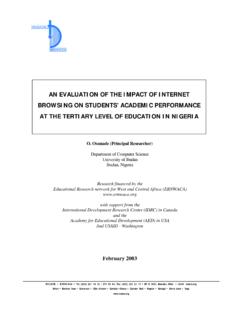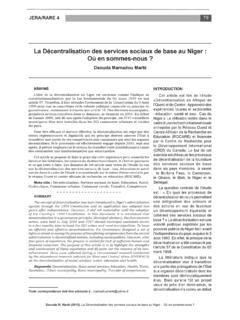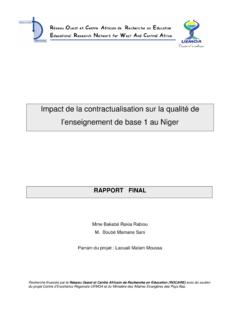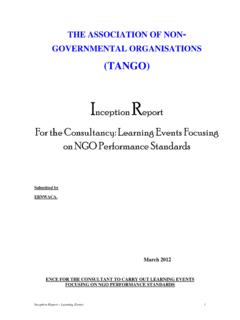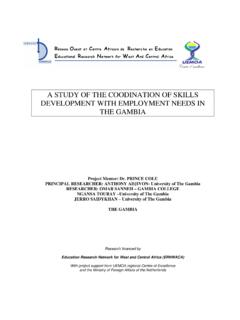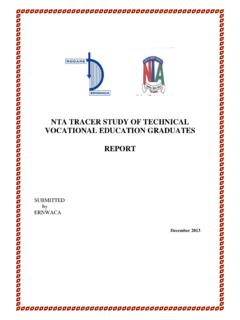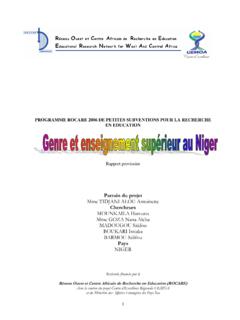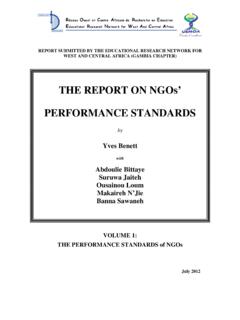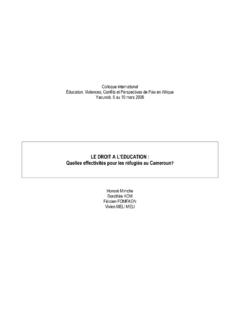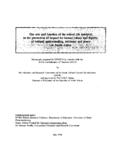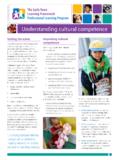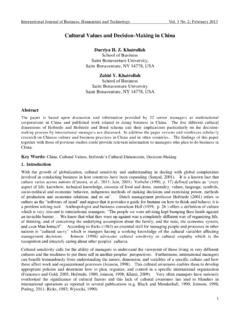Transcription of Socio-cultural factors affecting gender inequality …
1 Socio-cultural factors affecting gender inequality in higher education: the case of doctorate students in some cameroonian universitiesJudith Sama YEBA, pse Mouokuio MEnoUniversity of Yaounde 1, / study focuses on societal and cultural factors that impede women s progress in higher education in Cameroon. Specifically, the study finds out how marital status, tradition, participation in decision-making and financial autonomy can influence gender inequality in higher education. The study hypothesizes in the main that there is a significant relationship between Socio-cultural factors and gender inequality at the doctorate level in Cameroonian universities. The population consisted of 77 female doctorate students from three universities in Cameroon.
2 The sample consisted of 63 female doctorate students chosen at random. Quantitative and qualitative data were collected through questionnaires and focus group discussions. Quantitative data were analyzed using the Chi-square (X2) statistical analysis. Qualitative data were analyzed by using content analysis. All the four hypotheses were accepted and the null hypotheses rejected. This implies that there is a relationship between Socio-cultural factors and gender inequality at the doctorate level. We recommend amongst others that women should be sensitized on the importance of mobile learning to them. The government should fight against all forms of Socio-cultural practices that impede women s progress in education for the realization of an inclusive and gender sensitive education.
3 Keywords: socio - cultural , gender , inequality , Doctorate, University, Mobile learningR sum Cette tude est ax e sur des facteurs soci taux et culturels qui portent entrave sur le progr s de la gent f minine dans l enseignement sup rieure au Cameroun. De mani re sp cifique, nous cherchons savoir comment des facteurs telles le statut marital, la tradition, la participation dans la sph re de prise de d cisions et l autonomie financi re peuvent influencer l in galit de genre dans l enseignement sup rieure. Notre hypoth se principale est qu il y a une relation significative entre les facteurs socioculturels et l in galit de genre au niveau doctoral dans les universit s Camerounaises. La population d tude est constitu e par des 77 candidates f minines au niveau doctoral dans trois universit s Camerounaises.
4 L chantillon d tude comprend 63 candidates f minine en doctorat choisi au hasard. Des donn es quantitatives et qualitatives ont t collect es par questionnaires et par discussion entre focus groupe. Les donn es quantitatives on t YEBA Judith S, Socio-cultural factors affecting gender inequality in higher education: the case of doctorate students in some cameroonian universities, J educ Res Afr 2015;7 es avec la m thode d analyse Chi-carr (X2) tandis que les donn es qualitatives ont t analys es par la m thode d analyse de contenu. Toutes nos quatre hypoth ses ont t valid es et les hypoth ses nulles rejet es. Ce qu implique qu il y a une relation entre les facteurs socioculturels et l in galit de genre au niveau doctoral dans les universit s Camerounaises.
5 Nous recommandons parmi autres que le gouvernement s efforce sensibiliser les femmes sur l importance des technologies mobiles d apprentissage; liminer toutes formes de pratiques socioculturelles qui emp chent le progr s de la gent f minine dans le secteur de l ducation et promouvoir la r alisation d une ducation inclusive. Mots-cl s : Socioculturel, genre, In galit , Doctorat, Universit , Apprentissage 13 of the International Covenant on Economic, Social, and cultural Rights articulates: Education is both a human right in itself and an indispensable means of realising other human rights. As an empowerment right, education is the primary vehicle by which economically and socially marginalized adults and children can lift themselves out of poverty and participate fully in their communities (UNESCO, 2003).
6 Several international frameworks have formalized commitments to improving learning opportunities for women and girls. The 1995 Beijing Platform for Action called on countries to ensure equal access to education for girls and eradicate female illiteracy. Girls education was singled out again in the Dakar Framework for Action (2000) and codified as one of the six Education for All (EFA) goals. The Millennium Declaration (MDG), signed in September 2000 at the United Nations Millennium Summit, commits the member countries to promote gender equality and empower women and eliminate gender disparity in all levels of education (Goal 3). The positive ripple effect of education for women and girls is so far-reaching that a number of international organizations, UNESCO and UN Women foremost among them, have persuasively argued it may be the single most effective tool for development (UNESCO, 2015).
7 What is unsettling is that although there is increasing articulation of awareness of the need to address gender inequalities there is not much evidence of the attitudinal changes. Practically, gender issues still remain peripheral to what are considered to be more important and urgent issues (Mathabe, 2009). In developing countries, millions of girls still receive little or no education. Although there are no formal obstacles preventing women from reaching high positions in colleges and universities, men still dominate at all levels of influence (UNESCO,1998). Until the beginning of 2008, Africa was on track to meet many of its MDGs but with the recent food, fuel and financial crises there is a high risk of slippage in meeting these targets, especially those related to health, education, and food security (Updated gender Plan of Action, 2009 2011).
8 Editions Universitaires de C te d Ivoire (EDUCI)jErA/rArE 7 Journal of Educational Research in Africa180At the national level, Cameroon has ratified a number of international conventions and instruments related to gender issues, such as the Convention on the Elimination of all Forms of Discrimination against Women (CEDAW). Unfortunately, we still identify gender bias and gender -neutral behaviours that discriminate and violate women s rights (World Bank, 2005; Endeley & Sikod, 2006). Although the number of women obtaining degrees in Universities has increased with time, very few women as compared to men are retained at the doctorate level. In a survey carried out by ERNWACA Cameroon (2003), in the developing world, girls and women have less access to education at all levels and lower levels of literacy.
9 This study will find out the Socio-cultural factors affecting gender inequality in higher education in Cameroon. The paper also advocates for the use of mobile learning for the educational advancement of women at the postgraduate level, because according to Hiple & Fleming, (2006), mobile technologies are an attractive and easy means to maintain literacy skills and gain constant access to information and thus hold great potential for reaching marginalized groups and providing them with access to further learning and development. contExtuAl BAckgrounDThis section describes in brief the context within which this study is carried out. Kibinkiri (2014) in his study revealed that in Cameroon the attainment of national and international expectations for education has generated a tremendous demand for education at all levels.
10 Education in Cameroon ranges from nursery, primary, and secondary to tertiary or higher education. The citizen s right to education is embodied in the 2008 reviewed constitution of the Republic of Cameroon. According to the preamble, the state shall guarantee the child s right to education; primary education shall be compulsory; the organization and supervision of education at all levels shall be the bounded duty of the state (Law No. 96-06 of 18 January 1996). This implies that barriers to education have been lifted and, to a certain extent, overcome: All Cameroonians have access to primary school education while secondary school is heavily subsidized, allowing for more girls to attend school.
